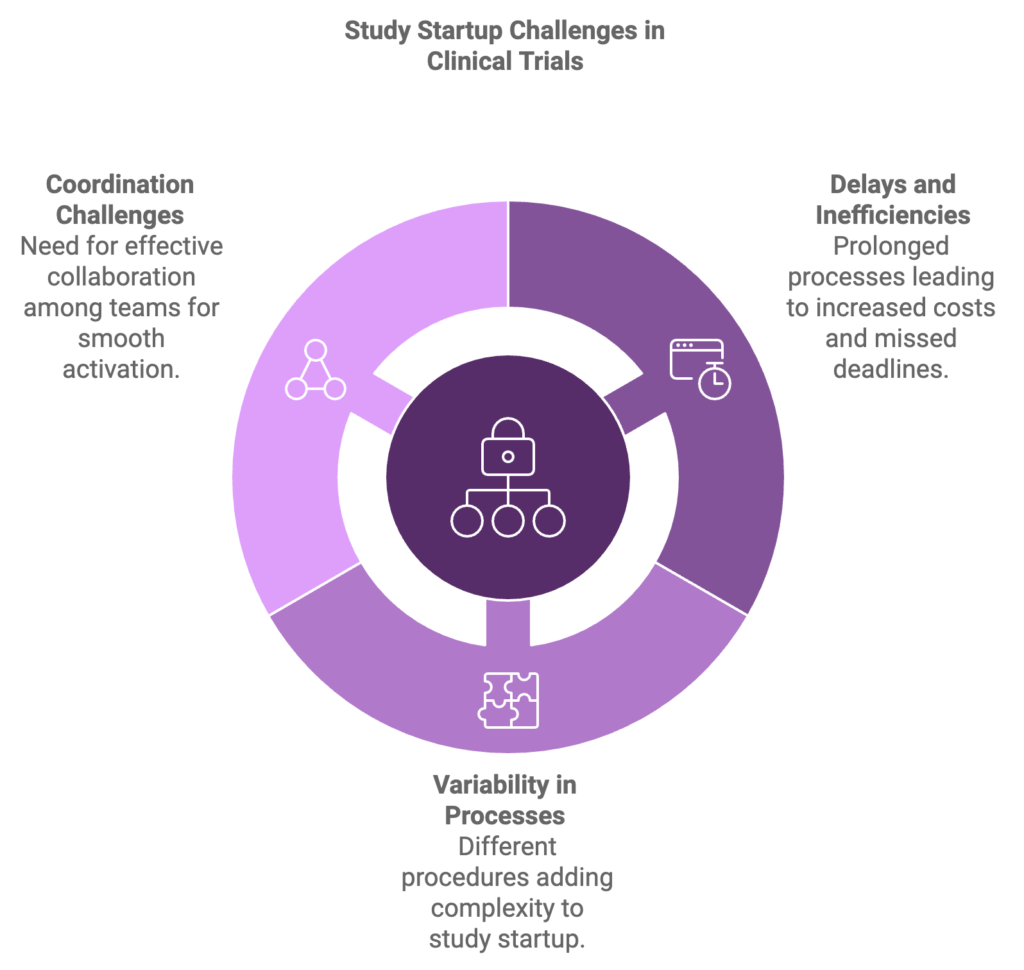
Study startup (SSU) is a crucial phase in the lifecycle of clinical research. It sets the foundation for the trial’s success and involves a series of intricate activities that require careful coordination across multiple teams. Any misstep during this stage can result in delays, increased costs, and even compromise the trial’s objectives. Let’s explore the key challenges, best practices, and innovative solutions that make SSU an essential element of a successful clinical trial.
Key Challenges in Study Startup

The complexities involved in SSU can make it a bottleneck for clinical trials. Some of the most common challenges include:
-
- Delays and inefficiencies: Prolonged SSU processes can affect timelines, leading to increased costs and missed trial deadlines.
-
- Variability in processes: Different research organizations and trials may have varying procedures for study startup, adding complexity to the process.
-
- Coordination challenges: Effective collaboration between teams, including sponsors, sites, and regulatory authorities, is critical for smooth activation of research sites.
Best Practices for Study Startup
To overcome these challenges, research organizations can implement best practices that streamline SSU:
-
- Comprehensive planning from day one: A well-structured plan at the outset can prevent many potential roadblocks.
-
- Protocol optimization: Ensuring the protocol is fine-tuned before trial activation can lead to more effective and efficient execution.
-
- Experienced IRB partnerships: Collaborating with Institutional Review Boards (IRBs) experienced in study startup processes can help avoid delays in site activation.
-
- Clear communication and expectations: Establishing open lines of communication between stakeholders ensures smooth coordination and prevents misunderstandings.
Core Study Startup Activities
SSU activities are diverse and encompass several operational and regulatory steps, including:
-
- Feasibility assessment and site selection: Evaluating potential research sites and determining their suitability for the trial.
-
- Site qualification and activation: Ensuring that selected sites meet all necessary criteria to participate in the trial.
-
- Protocol implementation and training: Training site staff on the protocol to ensure compliance and smooth trial execution.
-
- Kit preparation and shipment: Ensuring study materials are prepared and distributed to research sites.
-
- Database setup and data management: Creating the infrastructure for efficient data capture and analysis throughout the trial.
-
- Regulatory compliance and documentation: Ensuring all regulatory requirements are met, and necessary documents are submitted.
Innovative Solutions for Accelerating Study Startup
New technologies and strategic approaches can help overcome the traditional challenges of SSU:
-
- Orchestrated Study Startup: This strategic, global approach accelerates site activation while maintaining site engagement throughout the trial, ensuring ongoing compliance and operational efficiency.
-
- Vault Study Startup: A digital platform designed to manage the end-to-end process of site activation, from feasibility to qualification, leveraging standardized workflows and milestones to speed up the process.
Conclusion
Study startup is undeniably a critical component of any clinical trial. By addressing the challenges through meticulous planning, adopting best practices, and embracing innovative solutions, research organizations can reduce delays, minimize inefficiencies, and improve the overall outcome of clinical trials. When done correctly, a streamlined SSU process leads to better site engagement, enhanced patient recruitment, and a higher likelihood of trial success.